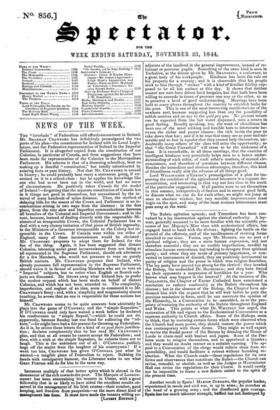Instances multiply of that better spirit which is abroad in
the demeanour of the rich towards the poor. The Marquis of LONDON- DERRY has been entertaining his tenants in Ulster, with a good fellowship that is as likely to have aided the excellent results ob- served in the management of his Irish estates—their comfort, good keeping, and freedom from pauperism—as the more direct kind of management has doue. It must have made the tenants willing co- adjutors of the landlord in the general improvement, instead of re- luctant or perverse pupils. Something of the same kind is seen in Yorkshire, at the dinner given by Mr. BRANDLING, a coalowner, to a great body of his workpeople. Kindness has been the rule on his property for a century ; and it is observable that his people stick to him through " strikes " with a kind of familiar fidelity sup- posed to be all but extinct at this day. It shows that neither master nor men have driven hard bargains, but that both have been willing to concede in times of pressure one way or the other, so as to preserve a level of good understanding. Meetings have been held at many places throughout the country to establish baths for the poor. This is one of the most interesting manifestations of the newborn zeal, because suggesting less than any the possibility of selfish motives and an eye to the quid pro quo. No present return can be expected from the hot water dispensed, save a return in good feeling. Broadly speaking, too, the want of cleanliness has been one of the most striking and forcible bars to intercourse be- tween the richer and poorer classes : the rich invite the poor to take down that bar ; and if it be true that many are so poor and mi- serable and so lost in squalor that they cannot help themselves, un- doubtedly many others of the class will seize the opportunity ; so that " the Great Unwashed" will cease to be the nickname of a class. It is remarkable, in all these meetings, that the exercise of intelligent kindness very powerfully helps men to a better under- derstanding of each other, of each other's motives, of mutual cir- cumstances, and therefore of questions between different classes. Besides the immediate and obvious advantages, therefore, this kind of friendliness really aids the advance of all things good. Lord WILLoununr D'ERESBY'S promulgation of a plan for im- proving the condition of the agricultural labourers is a cognate de- monstration, and interesting in that way not less than in the merit of the particular suggestions. If all parties were to set themselves in this manner, irrespectively of faction and in earnest good faith, to discuss what we can do for each other, we might not jump at once to absolute wisdom, but very sensible improvements must begin on the spot, and many of the most noxious bitternesses must pass away at the word.


























